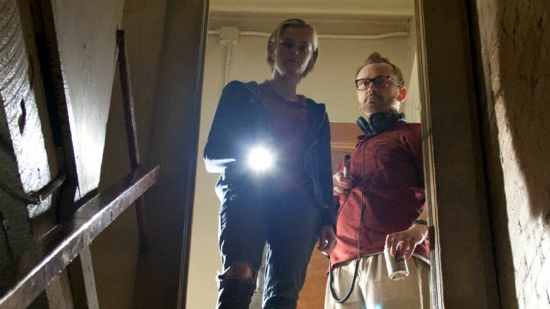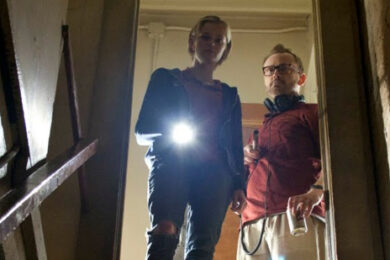Plenty of words have been written in recent years about the mostly American phenomenon that is the ‘mumblecore’ scene, but it’s one of those nebulous concepts: too loose and unassertive to really be a movement, but associated with a coterie of people that’s tight-knit enough – and a set of themes that’s coherent enough – to deserve some kind of status beyond simple geographical and temporal coincidence. Filmmakers such as Andrew Bujalski, Lena Dunham (who has a cameo here) and Joe Swanberg are the natural successors to the group of 1990s indie stars headed by Vincent Gallo, Harmony Korine and Chloë Sevigny, in that they’re talented people working within a certain shared aesthetic and enjoying the confidence that comes from their status as this generation’s Bright Young Things.
It’s not quite the same, though. That aesthetic has moved on, for one thing. The likes of Kids (1995) and Gummo (1997) gave us bleak, depressed, drug-addicted portrayals of youth. Now we have the bored children of the New York/Boston intelligentsia, newly graduated from college and trying to work out how to cope with life (albeit often with the safety net of their parents’ money waiting to catch them). Co-produced, like most of Ti West’s work, by independent scene veteran Larry Fessenden’s celebrated studio Glass Eye Pix, The Innkeepers tells the story of two such going nowhere dropouts. Luke and Claire (Pat Healy and Sara Paxton) are on duty at the Yankee Pedlar Inn. It’s the last weekend before the establishment is due to be demolished. Luke runs a website dedicated to sightings of the building’s resident ghost, Madeline O’Malley, and the pair are trying to document her presence before it’s too late. When they’re not dealing with the remaining handful of guests (including one played by erstwhile Top Gun star Kelly McGillis) or lazing around the hotel lobby exchanging banter, they’re fiddling with cameras and microphones.
West has stuck with the haunted house horror he’s obviously comfortable with, but the 31-year-old writer, director and editor is also moving on. His excellent 2009 feature The House Of The Devil (co-starring mumblecore queen Greta Gerwig) was very much a period piece, going beyond pastiche to be almost indistinguishable from an authentic early ’80s movie. The Innkeepers has a lot more in common with what could be termed ‘modern-traditional’ horror such as The Cabin In The Woods or the ongoing Paranormal Activity series. That is to say, films that are structured in traditional ways and rely on traditional forms of storytelling as much or more than they do on the self-referential, ultimately parodic tropes that arose in the mid-’90s with Scream. How frightening films are is pretty subjective; circumstances play a part, as does predisposition. But in terms of classically constructed horror, if you’re susceptible, The Innkeepers is very scary. For that alone, it deserves praise.
West has said that his screenplay was inspired by the bizarre events the cast and crew of The House Of The Devil experienced while staying at the real Yankee Pedlar Inn in Connecticut (in that sense, it really is ‘based on a true story’). One thing both movies have in common is their exquisite attention to detail, which also demonstrates the essential difference between them. In The House Of The Devil, everything from the production design to the use of 16mm film stock and dated photography techniques is intended to create the illusion of a film that was actually made in the 1980s, not a pastiche of one. It wants to be new at a certain time, not old at the current time. The detailing of The Innkeepers has a more subtle effect. It adds a verisimilitude to the look of the setting, but that setting is a place that’s already old, and is trying to pretend to be from an even earlier era. The hotel wants to be authentically old-fashioned in a pleasing way, and it’s also actually cluttered with ugly old stuff beneath the patina of charming retro style.
This is an interesting shift in design, because to a certain extent it’s reflected in the story and structure of the two films. The House of the Devil is about the ’80s panic over Satanic cults; it’s bang up to the minute with what it’s pretending to be. Conversely, The Innkeepers builds on generations of horror flicks and the clichés that have arisen from them, reminding us that just because something is a trope, that doesn’t mean it can’t be genuinely terrifying. The styling is gloss, to one extent, but it’s also the whole point.
There’s none of Scream‘s smirking postmodernism, but the whole thing is a familiar structure supporting a series of clichéd frights. Like the hotel, the styling covers over the fact that the movie is, on one level, exactly what it pretends to be. The mumblecore trappings – the nerdiness, naturalistic dialogue and sympathetic characters (compare Sara Paxton’s well-rounded Claire to Jocelin Donahue’s deliberately stereotypical victim chick in The House Of The Devil) – give The Innkeepers a contemporary freshness, but they’re also extremely well-suited to its retro structure.
Recent shifts in the horror genre away from parody and back to straight scary should be welcome. It’s possible for films to feel both fresh and traditional, serious and funny at the same time, without resorting to the knowing, self-reflexive stuff. It can seem disingenuous – the tragicomic The Cabin In The Woods wants to have its postmodern cake and eat it too – but the trade-off for this is believable characters, and the pleasure of pure frights lacking in other agendas. It’s frustrating for the viewer to see clueless characters actually going down into the basement, but now it can be frustrating in the same way as it was in ’80s: it’s allowed to be scary again. In discovering that this is okay, and showing us that it’s okay, The Innkeepers frees up the clichés and gives them back some power.



